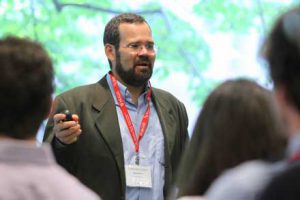
By Neale McDevitt
If women are from Venus and men are from Mars, as asserted in the 1992 best-selling book by American author and relationship counselor John Gray, then it might also hold true that chemists are from Saturn, engineers are from Mercury and business people are from Jupiter, so different are their respective worlds.
But, as with men and women, chemists, engineers and business people often find themselves working together, hoping to forge a partnership that is both lasting and mutually beneficial.
With this in mind, McGill’s Desautels Faculty of Management hosted a unique event Sept. 7-8, which brought together graduate students in chemistry and engineering along with MBA students for a two-day workshop on green chemistry.
“We believe this the first of its kind worldwide in which we take MBA students and graduate students from chemistry and engineering,” said Chemistry professor Audrey Moores, one of the co-organizers of the event along with Steve Maguire, Director of the Marcel Desautels Institute for Integrated Management. “Basically we wanted to lock them in a room, shake it, and see what would happen.”
Moores said the goal of the workshop was to get the students from one discipline to gain a better understanding of the mindset and professional realities of the others in order to recognize and overcome the barriers to green innovations.
“We wanted them to talk to each other and work together to get a better grasp of the challenges involved in making innovation that is eventually marketable,” she said. “That’s not easy conceptually because business people tend to forget that we [chemists] generate ideas and innovation all the time and the students on the other side have very little understanding of what it takes to have a new concept end up on the market.”
“McGill is a world hub for green chemistry but the green chemistry being done here is more basic research and pre-commercialization,” said Maguire. “The idea was to give students a better understanding about how something goes from someone’s lab to actually being implemented in industry.”
The first day had participants take in a pair of presentations on the role of green chemistry in industry. Phil Dell’Orco, Director, Process Engineering at GlaxoSmithKline, kicked things off with a discussion about balancing the bottom line with sustainable science. This was followed by a presentation on bringing clean technologies to the market by Lynn Leger of GreenCentre Canada, a Kingston-based outfit that helps commercialize green-chemistry innovations from academia and small businesses.
The highlight of the Saturday session – and the cornerstone of the workshop itself – was the business case competition. The group was broken up into five groups of four, each with a mix of MBAs and chemists or engineers. Leger presented a real case of a technology that she believes has some potential. Each team was given three hours to work on the file and to prepare a 10-minute PowerPoint presentation making recommendations on how to get the technology to the marketplace.
“There were some very different possible markets for this technology, from rubber to cosmetics to plastics. Each team had to look at the commercial potential for each of these markets. What would you be competing against? What price point would you have to hit in each of those markets? There were a lot of commercial considerations and issues in play,” said Maguire. “But then there were also some technical issues. For example, could we make this product even greener by perhaps changing the synthesis of it, and how would that effect the bottom line?
Maguire said much of the early part of the case competition was spent with people from one discipline just learning the basic terminology of the other. “The students had to learn how to speak with one another and carry out a conversation in order to address these issues and build their case,” he said. “And that was an explicit learning point – for these management students to engage with technical experts in a way that was efficient and for the chemists to convey how to communicate science to managers and business people.”
In the end, Moores and Maguire were impressed with each group’s final presentations. “They were all of a very high quality,” said Moores. “No presentation was perfect, but each one contained perfect bits.”
Having gone through and digested the comments from workshop participants, Moores and Maguire are already planning next year’s revamped version. Among the possible tweaks are primers on chemistry and management that include basic terminology and concepts to be distributed before the event and more time allotted for the case competition.
“At the end of the day a lot of them actually met after the workshop and chatted about research,” said Moores. “One of the goals was to have them create a network so who knows? Maybe this is the start of some interesting collaborations.”
